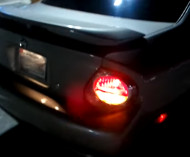Article from: www.thenewspaper.com/news/66/6627.asp
1/10/2019
Federal Court Upholds Traffic Stop Over Fast Blinker
Properly indicating a turn with a signal that is in working order, but blinks rapidly, is potentially unlawful under federal appeals court ruling.
 Driving with a turn signal that blinks "too fast" is a potentially criminal act under a ruling handed down Tuesday by the Eleventh Circuit US Court of Appeals. The three-judge appellate panel set the precedent after considering a traffic stop that took place on December 12, 2013, in Greene County, Georgia.
Driving with a turn signal that blinks "too fast" is a potentially criminal act under a ruling handed down Tuesday by the Eleventh Circuit US Court of Appeals. The three-judge appellate panel set the precedent after considering a traffic stop that took place on December 12, 2013, in Greene County, Georgia.
On that day, Deputy Sheriff Robert McCannon stopped the Erickson Meko Campbell's Nissan Maxima on Interstate 20 in Georgia after noticing his turn signal blinked rapidly when making a lane change. The deputy also said he saw the gray sedan cross the fog line once, then after he turned on his dashcam, that it crossed a second time. When the video footage of the stop showed no such thing, prosecutors stuck with the blinker as justification for the stop. The case is unusual because Campbell's blinkers were in fact working, and the video showed the signal was clear and visible. During the traffic stop, the deputy checked all of the lights on the Maxima, and none were burned out. There is no standard in the Georgia Code for how fast a turn signal should blink.
"But the rapid blinking is an alert that something, be it an expired bulb or faulty wiring, might not be in good working condition," Judge Gerald Bard Tjoflat wrote for the court. "Thus, the rapidly blinking turn signal provided McCannon with reasonable suspicion to believe that Campbell's car was in violation of the traffic code."
The judges pointed to a provision in Georgia law requiring all equipment being kept in "good working condition," suggesting Campbell's blinker was not in compliance because it was in working condition, just not "good" working condition.
"If all the statute demanded is that the turn signal be visible from 300 feet and clearly indicate an intention to change lanes, the good working condition language would be superfluous," Judge Tjoflat wrote. "It must mean more."
The court did take issue with Deputy McCannon's elaborate roadside questioning. Campbell was pressed on his travel plans, his knowledge of Augusta, where he worked, if he had time off work, how old his car was, what kind of deal he received on his car and his traffic and criminal history.
"Any counterfeit merchandise that you're taking to your relatives in Augusta?" the deputy inquired. "And what I mean by that is -- any purses? Shoes? Shirts? Any counterfeit or bootleg CDs or DVDs? Anything like that? Any illegal alcohol? Any marijuana? Any cocaine? Methamphetamine? Any heroin? Any ecstasy? Nothing like that? You don't have any dead bodies in your car?"
Under the US Supreme Court ruling in Rodriguez v. US (view ruling), police may not "measurably" prolong a traffic stop with such questions.
"We think the proper standard emanating from Rodriguez is this: a stop is unlawfully prolonged when an officer, without reasonable suspicion, diverts from the stop's purpose and adds time to the stop in order to investigate other crimes," Judge Tjoflat wrote.
The court found the unrelated investigation of potential dead bodies in the trunk wasted 25 seconds of Campbell's time, violating the new standard set by the appellate court. Since this is a new precedent, however, the court did not apply the exclusionary rule to the case. That is bad news for Campbell, because when his Maxima was searched, the deputy found a High Point C9 9mm pistol inside a black and gray Michael Jordan gym bag. Campbell could not legally possess this weapon.
A copy of the ruling is available in a 200k PDF file at the source link below.
Source: US v. Campbell (US Court of Appeals, Eleventh Circuit, 1/8/2019)
Permanent Link for this item
Return to Front Page
 Driving with a turn signal that blinks "too fast" is a potentially criminal act under a ruling handed down Tuesday by the Eleventh Circuit US Court of Appeals. The three-judge appellate panel set the precedent after considering a traffic stop that took place on December 12, 2013, in Greene County, Georgia.
Driving with a turn signal that blinks "too fast" is a potentially criminal act under a ruling handed down Tuesday by the Eleventh Circuit US Court of Appeals. The three-judge appellate panel set the precedent after considering a traffic stop that took place on December 12, 2013, in Greene County, Georgia.